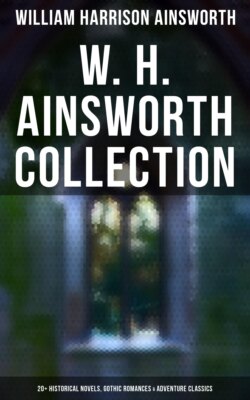Читать книгу W. H. Ainsworth Collection: 20+ Historical Novels, Gothic Romances & Adventure Classics - William Harrison Ainsworth - Страница 78
На сайте Литреса книга снята с продажи.
CHAPTER 6
BLACK BESS
ОглавлениеTable of Contents
Dauphin. I will not change my horse with any that treads but on four pasterns. Ca, ha! He bounds from the earth as if his entrails were hairs; le cheval volant, the Pegasus qui a les narines de feu! When I bestride him, I soar, I am a hawk: he trots the air; the earth sings when he touches it; the basest horn of his hoof is more musical than the pipe of Hermes.
Shakespeare: Henry V., Act III.
Black Bess being undoubtedly the heroine of the Fourth Book of this Romance, we may, perhaps, be pardoned for expatiating a little in this place upon her birth, parentage, breeding, appearance, and attractions. And first as to her pedigree; for in the horse, unlike the human species, nature has strongly impressed the noble or ignoble caste. He is the real aristocrat, and the pure blood that flows in the veins of the gallant steed will infallibly be transmitted, if his mate be suitable, throughout all his line. Bess was no cock-tail. She was thorough-bred; she boasted blood in every bright and branching vein:
If blood can give nobility,
A noble steed was she;
Her sire was blood, and blood her dam,
And all her pedigree.
As to her pedigree. Her sire was a desert Arab, renowned in his day, and brought to this country by a wealthy traveller; her dam was an English racer, coal-black as her child. Bess united all the fire and gentleness, the strength and hardihood, the abstinence and endurance of fatigue of the one, with the spirit and extraordinary fleetness of the other. How Turpin became possessed of her is of little consequence. We never heard that he paid a heavy price for her; though we doubt if any sum would have induced him to part with her. In color, she was perfectly black, with a skin smooth on the surface as polished jet; not a single white hair could be detected in her satin coat. In make she was magnificent. Every point was perfect, beautiful, compact; modelled, in little, for strength and speed. Arched was her neck, as that of the swan; clean and fine were her lower limbs, as those of the gazelle; round and sound as a drum was her carcase, and as broad as a cloth-yard shaft her width of chest. Hers were the “pulchræ clunes, breve caput, arduaque cervix,” of the Roman bard. There was no redundancy of flesh, ’tis true; her flanks might, to please some tastes, have been rounder, and her shoulders fuller; but look at the nerve and sinew, palpable through the veined limbs! She was built more for strength than beauty, and yet she was beautiful. Look at that elegant little head; those thin, tapering ears, closely placed together; that broad, snorting nostril, which seems to snuff the gale with disdain; that eye, glowing and large as the diamond of Giamschid! Is she not beautiful? Behold her paces! how gracefully she moves! She is off! — no eagle on the wing could skim the air more swiftly. Is she not superb? As to her temper, the lamb is not more gentle. A child might guide her.
But hark back to Dick Turpin. We left him rattling along in superb style, and in the highest possible glee. He could not, in fact, be otherwise than exhilarated; nothing being so wildly intoxicating as a mad gallop. We seem to start out of ourselves — to be endued, for the time, with new energies. Our thoughts take wings rapid as our steed. We feel as if his fleetness and boundless impulses were for the moment our own. We laugh; we exult; we shout for very joy. We cry out with Mephistopheles, but in anything but a sardonic mood, “What I enjoy with spirit, is it the less my own on that account? If I can pay for six horses, are not their powers mine! I drive along, and am a proper man, as if I had four-and-twenty legs!” These were Turpin’s sentiments precisely. Give him four legs and a wide plain, and he needed no Mephistopheles to bid him ride to perdition as fast as his nag could carry him. Away, away! — the road is level, the path is clear. Press on, thou gallant steed, no obstacle is in thy way! — and, lo! the moon breaks forth! Her silvery light is thrown over the woody landscape. Dark shadows are cast athwart the road, and the flying figures of thy rider and thyself are traced, like giant phantoms, in the dust!
Away, away! our breath is gone in keeping up with this tremendous run. Yet Dick Turpin has not lost his wind, for we hear his cheering cry — hark! he sings. The reader will bear in mind that Oliver means the moon — to “whiddle” is to blab.
